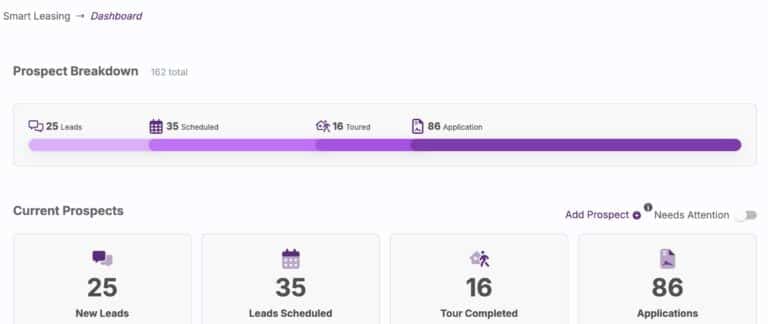Over the past year, the Multifamily industry has pivoted toward new approaches in apartment leasing due to the pandemic. Virtual tours, amenity scheduling, and technology-assisted leasing have all become the new normal.
And, it looks like these tech glow-ups are here to stay as more and more apartment communities look for long-term ways to make their operations more efficient. Let’s face it: People are stressed. Apartment community staffers are having to do more with less while providing top-notch customer service. It’s a tough job.
So, what’s the solution? Increasingly, apartment communities are turning to AI technology. When it comes to Multifamily, AI-driven tools like apartment chatbots and virtual leasing agents (smart leasing agents) can help by tackling easy, repetitive tasks and leaving more complex tasks to humans.
AI is all around us, and we interact with it as part of our daily lives. Consider this: By the end of 2021, an estimated 85% of customer interactions will be handled without humans.
But before an apartment community adopts one of these forms of AI technology, it’s important to understand their capabilities and limitations. In a nutshell, an autoresponder will automatically send template-based responses to users’ who reach out, an apartment chatbot’s function is to provide answers to users’ questions about an apartment community, while a smart leasing agent nurtures an apartment lead throughout the leasing process.
In this post, we will take a look at autoresponders, apartment chatbots, and virtual leasing agents – explain what they are, what they do, and how they’re different.
What are Autoresponders?
Autoresponders automatically send template-based responses. A standard message that is triggered to send when a prospect submits a contact form from a website or ILS. The same email text is used for each conversation. An autoresponder is triggered to send when a prospect submits a contact form from a website or ILS.
What are Apartment Chatbots?
Chatbots are AI-powered automated software programs designed to interact with humans via text. They primarily live on apartment websites and engage with users when a predetermined action occurs, like a prospect typing into the pop-up box. Some apartment chatbots can be extended beyond the apartment website by placing their URL link in desired locations.
The most effective apartment chatbots use machine learning and natural language processing (NLP) to communicate like people do. Over time, the chatbot’s language capabilities and its ability to understand new concepts should become more sophisticated.
An apartment chatbot can answer questions about floor plans, pet policies, and unit availability, for instance, and the best chatbots are designed to give users the option of communicating with a human if it isn’t able to answer to their satisfaction.
What are Virtual Leasing Agents?
Smart leasing agents (or assistants) are also powered by AI and use natural language processing, but they’re capable of more than a transactional conversation. The role of AI leasing agents is to nurture leads and nudge them down the path with a completed rental application as the ultimate goal. Some even go beyond the completed application and communicate with residents after the lease signing.
The AI leasing agent is capable of handling all lead-nurturing communications, including reminders, tour scheduling and follow-ups. Like apartment chatbots, virtual leasing agents can also answer prospects’ questions along the way.
In most cases, once the application has been completed, the virtual agent steps back and allows a human leasing agent to take it from there.
To recap, there are multiple AI leasing options available to you, the main difference is in the breadth and depth of what they can do.
How are Autoresponders, Apartment Chatbots and Virtual Leasing Agents Similar?
How are Autoresponders, Apartment Chatbots and Virtual Leasing Agents Similar?
Autoresponders arguably can’t compete with Chatbots and Leasing Agents based on the fact that it is simply a standardized message that is triggered to send when a prospect submits a contact form from a website or ILS. If they use natural language processing, virtual leasing agents have an edge over chatbots when it comes to understanding what a user is communicating. Virtual agents that use NLP can better understand intent, which is different from simply knowing what is being said. So, they interact with users much like another human would.
Some apartment chatbots also use NLP, but most use rule-based communication, which means the answers they offer are generally programmed.
In either case, when communicating with an NLP agent – whether it’s an apartment chatbot or a smart leasing agent – customers experience a naturally flowing conversation and increased accuracy with responses, without the frustrating hiccups that can occur with rule-based agents.
You can think of a chatbot as a friendly receptionist who is there to answer basic questions about an apartment community, while a virtual agent is a step above that who is tasked with end-to-end lead nurturing, ultimately ensuring that prospects fill out a rental application.
Conclusion
Autoresponders, apartment chatbots, and virtual leasing agents are capable of making life easier for stressed apartment community staffers. But they’re not the same.
While autoresponders keep up with contact form submissions, chatbots take simple tasks off the plates of human leasing agents, like answering queries about the community, and virtual leasing agents bring additional value by helping to convert apartment leads into residents.
Respage has unveiled a new AI leasing agent, ResMate™, that will be the most comprehensive and effective virtual leasing solution on the market.
Learn why ResMate™, our AI leasing agent, is the best in Multifamily.






